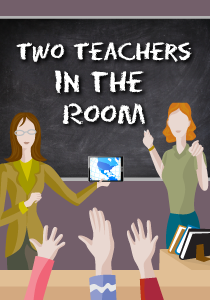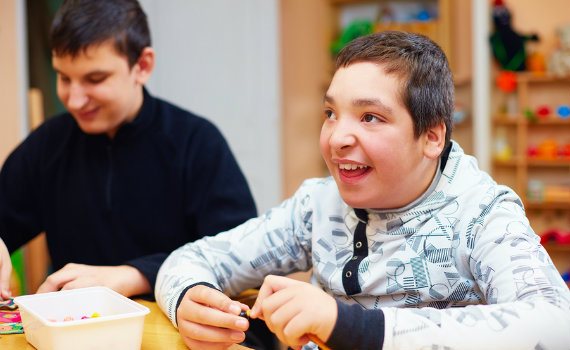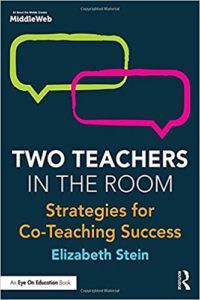Co-Teaching for Justice and Equity, with Dr. King
A MiddleWeb Blog
 January brings about a spirited sense of advocacy, commitment, dedication, and compassion as we honor the achievements of Martin Luther King Jr.
January brings about a spirited sense of advocacy, commitment, dedication, and compassion as we honor the achievements of Martin Luther King Jr.
Teachers include thematic classroom activities, and communities around the nation honor his legacy through service opportunities.
The purpose of this post is to invite co-teachers to continue reflecting throughout the year on the ways their attitudes and actions extend the values and hopes that Martin Luther King Jr. inspired for our country.
So how about it! Let’s extend our January reflections and knowledge and let Dr. King’s example continue to move us on a very conscious level to co-create equity in our inclusive classrooms.
As we think about our actionable steps, I offer my ideas about how to connect and apply the framework of The Four Agreements shared by Glenn E. Singleton in Courageous Conversations about Race: A Field Guide for Achieving Equity in Schools with the inspiring values of Dr. King.
I use this framework to guide my own action steps as I work with educators to co-create equitable, meaningful learning experiences in co-taught classrooms. As I share each actionable step of the framework, I am also sharing a quotation by Martin Luther King Jr. that I feel connects to empower us today. See what you think!
1. Stay engaged
The hope is for individuals to stay engaged in ways that keep them fully involved. Be morally courageous as well as socially and intellectually engaged in critical conversations.
Dr. King’s Connections:
In the end, we will remember not the words of our enemies, but the silence of our friends.
Intelligence plus character – that is the goal of true education.
What Co-Teachers CAN DO!
Advocate for students’ best interest on a daily basis. That means assessing the classroom management procedures, instructional decisions, and overall sense of community in the classroom. Notice what needs to change in order to align with each student’s strengths and incorporate an inclusive mindset. Share strategies that would work to make each student feel included as a natural part of the class learning community.

Each co-teacher must express ideas in support of what works best to make each learner feel empowered in the classroom. Sometimes we have to express an idea that may or may not be supported by colleagues. But if it is what is best for students…it MUST be said.
2. Experience discomfort
Embrace feeling uncomfortable at times. Equate discomfort with feeling empowered to push through challenges. Being present in our discomfort can translate into a positive force that raises awareness and activates positive change.
Dr. King’s Connections:
 Out of the mountain of despair, a stone of hope.
Out of the mountain of despair, a stone of hope.
There comes a time when one must take a position that is neither safe nor politic nor popular, but he must take it because his conscience tells him it is right.
What Co-Teachers CAN DO!
As educators, we know that our voice – our decisions – our actions have a direct and indirect impact on the lives of our students. We MUST choose to be uncomfortable if we expect to push through challenges and create the kinds of educational experiences that empower them. At the next co-planning session, team meeting, or faculty meeting, be that person who is willing to shake things up for the rights of our students.
3. Speak your truth
With the mindset of embracing discomfort as a positive part of the growth process, be open to share your thoughts about what you feel is best for students. Be pragmatic and strategic yet be direct enough to express your individual ideas even if (especially if!) you think others won’t agree.
Dr. King’s Connections:
Our lives begin to end the day we become silent about things that matter.
Be a bush if you can’t be a tree. If you can’t be a highway, just be a trail. If you can’t be the Sun, be a star. For it isn’t by size that you win or fail. Be the best of whatever you are.
What Co-Teachers CAN DO!
Direct all of your energy to what you are able to do for students. Reframe any thinking that is discouraging you from doing what you ARE ABLE to do. Notice the resources around you. Notice the abilities in the students. And use your voice and passion to express your instincts for what students need.
4. Expect and accept non-closure
There is no need to rush to solutions. Be willing to relax in limbo while remaining open to moving ahead and co-creating solutions.
Dr. King’s Connections:
Forgiveness is not an occasional act—it is a constant attitude.
Only in darkness can you see the stars.
What Co-Teachers CAN DO!
As conversations unfold and present great potential for powerful action steps, consider that not all situations will require a quick solution. Some things will be best to be left to unfold naturally – without quick responses or impulsive reactions. Sometimes we need to speak our truth and let the situation marinate a bit. Give yourself permission to retreat into a strong resilient mode, remaining aware and present to participate in solutions as they naturally become revealed.
So…what are your connections?
How are you inspired by Dr. King’s words? More important…what are your specific situations and action steps that may be transformed through peaceful resilience and harmony?
OK! Here’s one more Dr. King quote to empower your steps for equitable learning in inclusive settings this year…
True peace is not merely the absence of tension; it is the presence of justice.
Reference:
The Four Agreements adapted from Glenn E. Singleton & Curtis Linton, Courageous Conversations about Race: A Field Guide for Achieving Equity in Schools. 2006. pp.58-65. Thousand Oaks, CA: Corwin.
_____________________________________________________________________________________
 Elizabeth Stein’s book Two Teachers in the Room: Strategies for Co-Teaching Success is a Routledge/MiddleWeb publication. MiddleWeb readers receive a 20% discount from Routledge with the code MWEB1.
Elizabeth Stein’s book Two Teachers in the Room: Strategies for Co-Teaching Success is a Routledge/MiddleWeb publication. MiddleWeb readers receive a 20% discount from Routledge with the code MWEB1.
Credits:
Photo – Bigstock
Feature Image – National Park Service

































